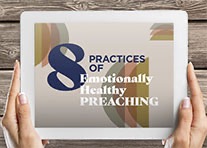As I prepare for my small group meeting this week I am mindful that we are not just about transformation, but very distinctly, Christian transformation. My reminder comes as I contemplate the work of theologian and New Testament scholar, Robert Mulholland, on the “eve” of his upcoming visit to NLF. I had the opportunity to sit under his teaching last year and next weekend he’ll be with our leadership community. Ever since I discovered (should say experienced) the life-changing integration of emotional health and spirituality I have wanted to eagerly lead others into transformation. Dr. Mulholland’s NT work dovetails beautifully with what I am seeking to accomplish in the lives of my small group members which is, putting off the false self and putting on the true self. This is a significant part of the growth required for Christian maturity and authentic loving. Robert Mulholland’s work is highly concentrated on keeping this transformation anchored in Christ. There are various transformational programs out there that help people effectively change but ours is different. It is always within the context of the historical and experiential truths of Christianity – that we are loved immensely and unconditionally by God, and can personally know and be changed by that cruciform love of God, as Mulholland calls it. As a Christian I’m not just learning conflict resolution tools so I can be more effective in my relationships, have a more successful career, be more impressive, have a less painful life or grow as a person, although these may all be benefits. My motivation is, above all else, the love of Christ. Mulholland reminds us that one of the most important questions is the question Christ asked Peter at the end of his earthly life. “Peter, do you love me more than these?” Loving Christ above all else is a very different approach to conflict resolution. Christ’s cruciform love is the context for all my work of “putting off the false self and putting on the new self.” Outwardly Christian conflict resolution may look similar to other skills programs but inwardly it matters where my mind and heart are anchored. It is from loving union with God I offer respect, mercy, forgiveness, love, and the other Christian virtues to others in all my interactions. Loving Him above all else is how we are designed to live fruitfully. When we live within the boundaries of life as ordained by Him we flourish. Sadly, our tendency is to be wayward, fearful and not trusting. Change is not enough to be a follower of Christ. That change is motivated by and couched in the Lordship of Christ where I continually return to Christ’s question to me, “Geri, do you love me more than these?”
29
Oct
What is the difference between Christian transformation and other transformational programs?
Posted on October 29th, 2013






